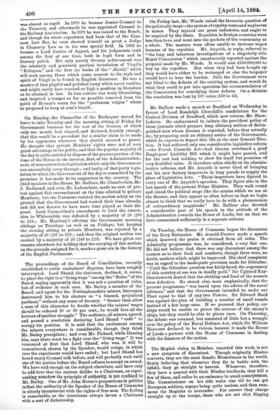The proceedings of the Board of Conciliation, recently established to
settle coalminers' disputes, have been roughly interrupted. Lord Shand, the chairman, declined, it seems, to place the right to a" living wage " among the "Rules " of the Board, saying apparently that it was not a question of rules, but of evidence in each case. Mr. Bailey, a member of the Board, and agent for the Nottinghamshire miners, thereupon denounced him to his electors as " a biassed, prejudiced partisan," without any sense of decency. " Sooner than allow a man of this character to decide whether the miners' wages should be reduced 20 or 30 per cent., he would face all the horrors of another struggle." The audience, all miners, agreed, and passed a resolution declaring Lord Shand " unfit " to occupy his position. It is said that the excitement among the miners everywhere is considerable, though they think Mr. Bailey precipitate ; and even Mr. Pickard, while blaming him, says there must be a fight over the " living wage." It was rumoured at first that Lord Shand, who was, it will be remembered, chosen by the Speaker, would resign, in which case the experiment would have ended ; but Lord Shand has heard angry Counsel talk before, and will probably wait until one of the parties before the Board refuses to accept an award. We have said enough on the subject elsewhere, and have only to add here that the curious dislike to a Chairman, as repre- senting somehow the principle of authority, is not confined to Mr. Bailey. One of Mr. John Burns's propositions in politics is that the authority of the Speaker of the House of Commons is utterly inconsistent with the rights of free men. The feeling is remarkable, as the Americans always invest a Chairman with a sort of dictatorship.


































 Previous page
Previous page